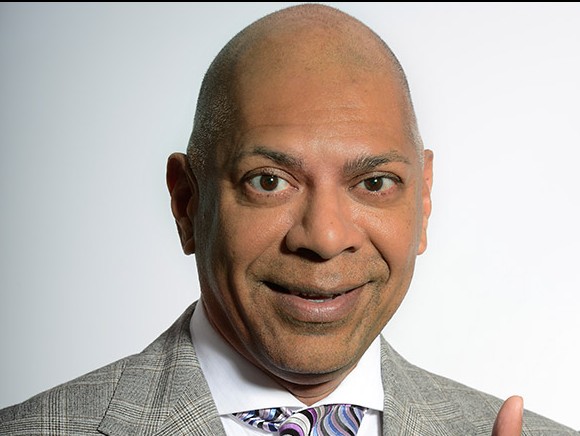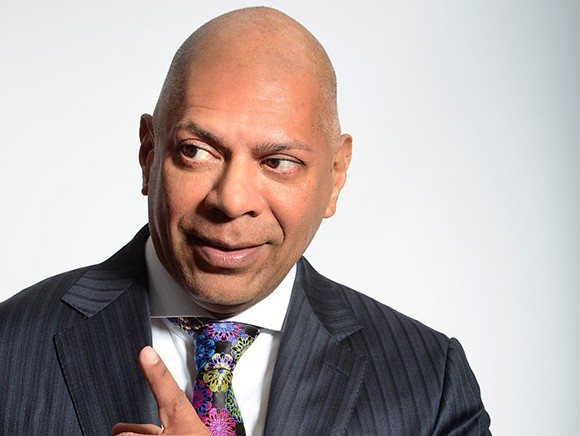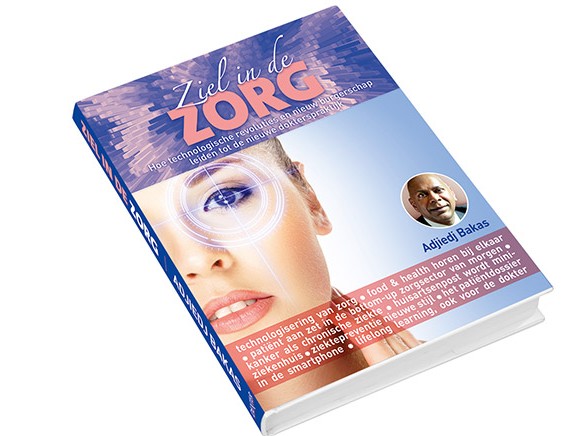
Adjiedj Bakas (1963) is one of the Netherlands’s leading trendwatchers. He studied communication science at Utrecht University and worked as an advisor to KLM and NOS. He then embarked on a new path, evolved into a trendwatcher and established Trend Office Bakas in Amsterdam. Besides that, he is a world traveller and art collector.
Bakas holds around 200 lectures each year and his books predicting the future have sold more than 700,000 copies. He has a special bond with food thanks to his family: his grandfather was a farmer in Surinam. Food also plays a major role in his work, as is evident from the lectures he holds on topics such as ‘farm & food’ and his 2012 book called The Future of Food which he dedicated to his Indian/Surinamese grandfather.
“Yes, the industry has done its best; it has become more sustainable and more transparent, and it is launching various good initiatives to make products healthier, such as by reducing sugar and salt. But government regulations are unfortunately holding back such initiatives. Dr. Oetker is working to reduce salt in pizza bases and to substitute it with herbs instead. Various pizza base suppliers were set to make the switch simultaneously but agreements on salt reduction were blocked by the competition authority which regarded them as cartel agreements. I’m all for cartels in situations like that! The government should handle healthy initiatives better.”
“My new book is called Ziel in de Zorg (‘Soul in Healthcare’) and is about health and nutrition. In it, I call for a single ministry that is responsible for both food and health. The current situation, in which food is part of the Dutch Ministry of Economic Affairs and health falls under the Ministry of Health, Welfare and Sport, is not beneficial to people’s health – as the example of salt in pizza bases demonstrates. That’s why I advocate a single ministry for both, as in the UK. I hope that my idea will receive sufficient political support. A single ministry for food and health would also be the right organisation, for example, to improve the quality of food in hospitals. The food served there currently is often poor – yet people who are ill generally tend to have less of an appetite anyway and many patients require extra food to help them regain their strength. Patients in Germany can choose to eat tasty meals from local restaurants if they wish. I think that’s a great idea. One thing that both the processing industry and retailers have tackled well is waste, so the call to do something about that clearly resonated with them. For example, there are far more smaller pack sizes for single-person households available in supermarkets nowadays.”
“Lots of people are saying terrible things about Monsanto and the resistance has only increased since the Bayer takeover, but in my view genetic modification is producing good results. It’s still often portrayed as a bad thing, but genetic modification has been used for centuries as a way of improving products.
‘Despite currently being two extremes, GMO and organic will both become popular’
That’s how they improved the potato in Peru more than 500 years ago, for example. A type of gourd called karela grows in India. It tastes terribly bitter, but is effective against diabetes. If they could manage to make that taste better, it would be a huge bonus for sufferers of that disease. So for the years ahead, my prediction is ‘GMO meets organic’. Despite currently being two extremes, they will both become popular.”
“That’s right. In the past we’ve paid the doctor to make us better, but we’ll soon be paying the farmer to keep us healthy. One example is the reversal of type-2 diabetes through diet, i.e. by eating healthily rather than taking pills.”
“The first one is food & health. You can see evidence of that in the new Princess Maxima Centre where there’s a heavy focus on healthy food. Secondly, more consumers are opting for organic. It’s becoming an important niche market. On top of that, people are willing to take more risks in terms of food safety as long as what they eat hasn’t been sprayed with pesticides. Thirdly, technology is becoming increasingly important in communicating with and informing consumers. You can use your smartphone to find out whatever you want to know about the product you intend to buy.”

“Nowadays, the industry is listening closely to consumers and, just like in other sectors, it’s increasingly a case of ‘from the bottom up’. The food industry is paying much closer attention to consumers’ wants and needs, especially compared with ten years ago.”
‘I advocate a single ministry that is responsible for both food and health’

De wereld, ook die van de zorg, verandert drastisch. Meebewegen, aanpassen, op blijmoedige manieren, is wat er nodig is; menselijke maat en warmte, passie en betrokkenheid koppelen aan hightech; wat een geweldige opgave! Zonder de mens raakt de zorg haar ziel kwijt, dus we zullen een evenwicht moeten zien te vinden tussen de krachten van regulering, technologisering en humanisering. "De toekomst onderga je niet, je maakt hem," aldus Bakas.
Meer lezen? Ga naar onderstaande site, gebruik de kortingscode TOEKOMST en ontvang 30% korting op het nieuwste trendboek van Adjiedj Bakas.
Source: © Avi Goodall